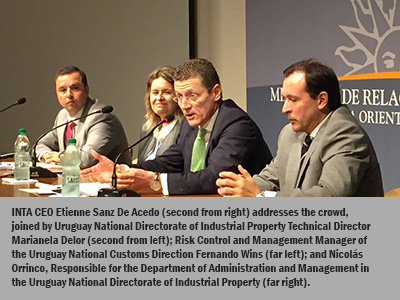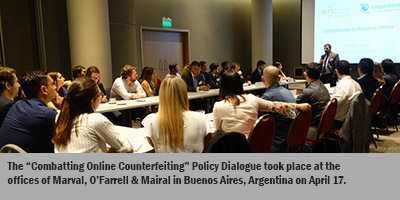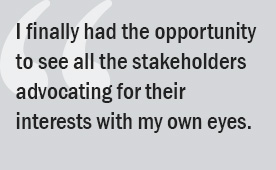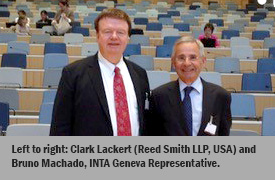Top Stories
Published: May 15, 2018
|
|
Interview
Interview: How the CROSSFIT Trademark Avoids Genericide
Rodrigo Bermeo-Andrade, Bermeo & Bermeo Law Firm, Quito, Ecuador
INTA Bulletins-Latin America and Caribbean Subcommittee Federico Berger, Buenos Aires, Argentina Famous and Well-Known Marks-Latin America and Caribbean Subcommittee
Association News
Country Names as Trademarks: WIPO Roundtable Discusses Current Best Practices
Clark Lackert, Reed Smith, LLP, New York, New York, USA
Geographical Indications Committee
|
 The event began with a review of last year’s Forum in Santiago by Maximiliano Santa Cruz, National Director of Chile’s National Institute of Industrial Property. Next, Hector Balmaceda, Directorof the National Directorate of Intellectual Property of Paraguay, and Rogelio Canales, Executive Director of El Salvador’s National Center of Registries, discussed the innovative ways in which their offices are tackling counterfeiting. INTA Board Member Maria Cecilia Romoleroux (CorralRosales, Ecuador) moderated a panel on oppositions and cancellations with the representatives from Belize, Ecuador, and Uruguay. Ray Meloni, Director of Peru’s National Institute for the Defense of Competition and Protection of Intellectual Property and John Alexander García Rodríguez Head of Cancelations and Oppositions of Colombia’s Superintendencia de Industria y Comercio discussed the role of IP Offices in consumer protection and respect for IP. A panel titled “Cooperation between National Enforcement Agents and IP Offices” was held with the various agencies from Uruguay and Irely Aquique Pineda, IP Enforcement Division Director at the Mexican Institute of Industrial Property (IMPI). The first day closed with a prestigious panel of Uruguayan judges focused on judicial criminal actions.
The event began with a review of last year’s Forum in Santiago by Maximiliano Santa Cruz, National Director of Chile’s National Institute of Industrial Property. Next, Hector Balmaceda, Directorof the National Directorate of Intellectual Property of Paraguay, and Rogelio Canales, Executive Director of El Salvador’s National Center of Registries, discussed the innovative ways in which their offices are tackling counterfeiting. INTA Board Member Maria Cecilia Romoleroux (CorralRosales, Ecuador) moderated a panel on oppositions and cancellations with the representatives from Belize, Ecuador, and Uruguay. Ray Meloni, Director of Peru’s National Institute for the Defense of Competition and Protection of Intellectual Property and John Alexander García Rodríguez Head of Cancelations and Oppositions of Colombia’s Superintendencia de Industria y Comercio discussed the role of IP Offices in consumer protection and respect for IP. A panel titled “Cooperation between National Enforcement Agents and IP Offices” was held with the various agencies from Uruguay and Irely Aquique Pineda, IP Enforcement Division Director at the Mexican Institute of Industrial Property (IMPI). The first day closed with a prestigious panel of Uruguayan judges focused on judicial criminal actions. 
 INTA’s Famous and Well-Known Marks-Latin America and Caribbean Subcommittee (FWKM, Latam SC) researches and advises on how famous marks can maintain their distinctiveness and avoid so-called genericide. Genericide occurs when a product or service is new in a particular market and the brand name, by default, becomes the generic term of reference for the product or service by the general public.
INTA’s Famous and Well-Known Marks-Latin America and Caribbean Subcommittee (FWKM, Latam SC) researches and advises on how famous marks can maintain their distinctiveness and avoid so-called genericide. Genericide occurs when a product or service is new in a particular market and the brand name, by default, becomes the generic term of reference for the product or service by the general public.
 In how many countries is the CROSSFIT mark registered and in how many is it being licensed?
In how many countries is the CROSSFIT mark registered and in how many is it being licensed?  As the extent of country name protection continues to be debated, from “nation branding,” to new gTLD domain names, to possible sui generis protection, the World Intellectual Property Organization (WIPO) sponsored an informational roundtable of experts for the Standing Committee on the Law of Trademarks, Industrial Designs, and Geographical Indications (SCT) on April 24 in Geneva, Switzerland, on the subject.
As the extent of country name protection continues to be debated, from “nation branding,” to new gTLD domain names, to possible sui generis protection, the World Intellectual Property Organization (WIPO) sponsored an informational roundtable of experts for the Standing Committee on the Law of Trademarks, Industrial Designs, and Geographical Indications (SCT) on April 24 in Geneva, Switzerland, on the subject.
